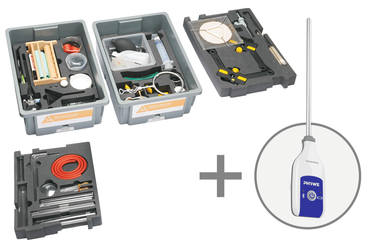Under hardness of water is understood the amount of dissolved salts (calcium salts and magnesium salts). The higher the amount of dissolved salts the "harder" the water. This can also be applied to drinking water, drinking water can be devided in accordance with the proportion of calcium and magnesium salts in hard and soft water. The difference hard and soft water is very important for everyday life. Hard water affects not only the need of detergent (reduced wash action), but also leads to calcification of household and means an increased energy consumption. This experiment demonstrates the influence of water hardness which is investigated with different water samples. Also the effect of soap in drinking water and distilled water is investigated.
Learning objectives
- Measurement of water hardness
- Influcence of water hardness in washing processes
Benefits
- Easy teaching and efficient learning by using interactive experimentation PHYWE-Software
- Experiment is part of a complete solution set with experiments for all Inorganic Chemistry matched with international curriculum: all topics are covered


